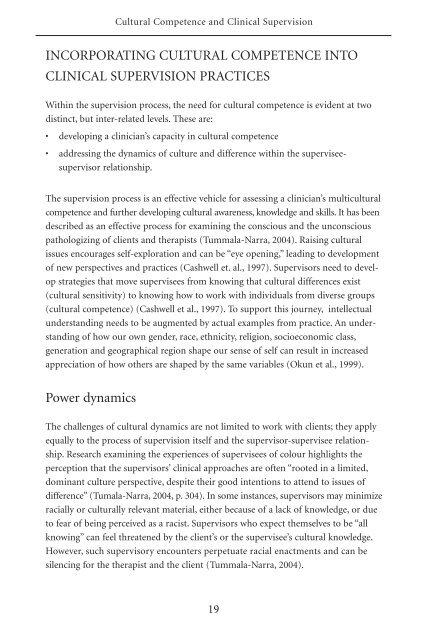Clinical Supervision Handbook - CAMH Knowledge Exchange ..
You also want an ePaper? Increase the reach of your titles
YUMPU automatically turns print PDFs into web optimized ePapers that Google loves.
Cultural Competence and <strong>Clinical</strong> <strong>Supervision</strong><br />
INCORPORATING CULTURAL COMPETENCE INTO<br />
CLINICAL SUPERVISION PRACTICES<br />
Within the supervision process, the need for cultural competence is evident at two<br />
distinct, but inter-related levels. These are:<br />
• developing a clinician’s capacity in cultural competence<br />
• addressing the dynamics of culture and difference within the superviseesupervisor<br />
relationship.<br />
The supervision process is an effective vehicle for assessing a clinician’s multicultural<br />
competence and further developing cultural awareness, knowledge and skills. It has been<br />
described as an effective process for examining the conscious and the unconscious<br />
pathologizing of clients and therapists (Tummala-Narra, 2004). Raising cultural<br />
issues encourages self-exploration and can be “eye opening,” leading to development<br />
of new perspectives and practices (Cashwell et. al., 1997). Supervisors need to develop<br />
strategies that move supervisees from knowing that cultural differences exist<br />
(cultural sensitivity) to knowing how to work with individuals from diverse groups<br />
(cultural competence) (Cashwell et al., 1997). To support this journey, intellectual<br />
understanding needs to be augmented by actual examples from practice. An understanding<br />
of how our own gender, race, ethnicity, religion, socioeconomic class,<br />
generation and geographical region shape our sense of self can result in increased<br />
appreciation of how others are shaped by the same variables (Okun et al., 1999).<br />
Power dynamics<br />
The challenges of cultural dynamics are not limited to work with clients; they apply<br />
equally to the process of supervision itself and the supervisor-supervisee relationship.<br />
Research examining the experiences of supervisees of colour highlights the<br />
perception that the supervisors’ clinical approaches are often “rooted in a limited,<br />
dominant culture perspective, despite their good intentions to attend to issues of<br />
difference” (Tumala-Narra, 2004, p. 304). In some instances, supervisors may minimize<br />
racially or culturally relevant material, either because of a lack of knowledge, or due<br />
to fear of being perceived as a racist. Supervisors who expect themselves to be “all<br />
knowing” can feel threatened by the client’s or the supervisee’s cultural knowledge.<br />
However, such supervisory encounters perpetuate racial enactments and can be<br />
silencing for the therapist and the client (Tummala-Narra, 2004).<br />
19


